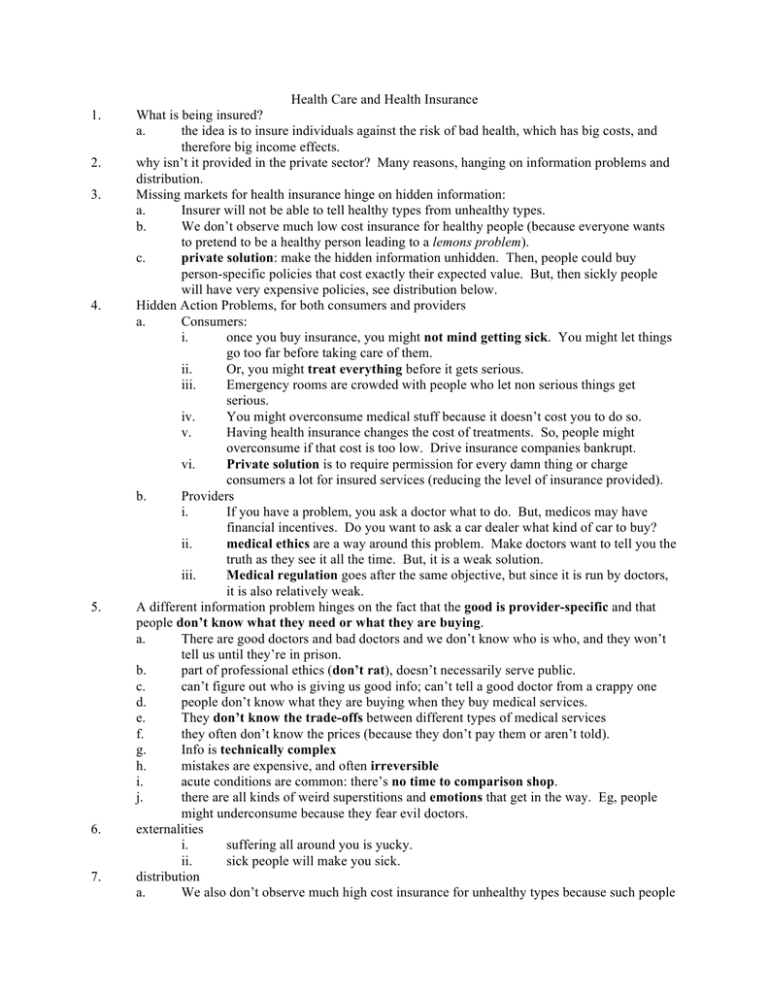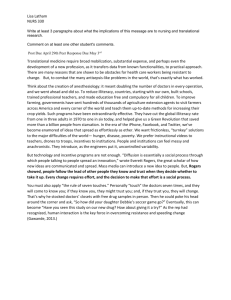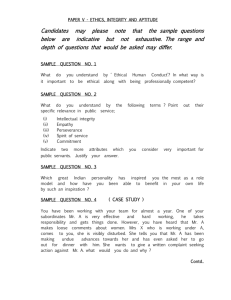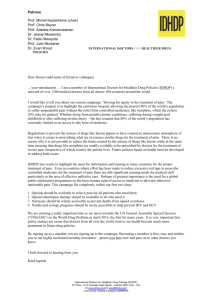Health Care and Health Insurance 1. What is being insured? a.
advertisement

1. 2. 3. 4. 5. 6. 7. Health Care and Health Insurance What is being insured? a. the idea is to insure individuals against the risk of bad health, which has big costs, and therefore big income effects. why isn’t it provided in the private sector? Many reasons, hanging on information problems and distribution. Missing markets for health insurance hinge on hidden information: a. Insurer will not be able to tell healthy types from unhealthy types. b. We don’t observe much low cost insurance for healthy people (because everyone wants to pretend to be a healthy person leading to a lemons problem). c. private solution: make the hidden information unhidden. Then, people could buy person-specific policies that cost exactly their expected value. But, then sickly people will have very expensive policies, see distribution below. Hidden Action Problems, for both consumers and providers a. Consumers: i. once you buy insurance, you might not mind getting sick. You might let things go too far before taking care of them. ii. Or, you might treat everything before it gets serious. iii. Emergency rooms are crowded with people who let non serious things get serious. iv. You might overconsume medical stuff because it doesn’t cost you to do so. v. Having health insurance changes the cost of treatments. So, people might overconsume if that cost is too low. Drive insurance companies bankrupt. vi. Private solution is to require permission for every damn thing or charge consumers a lot for insured services (reducing the level of insurance provided). b. Providers i. If you have a problem, you ask a doctor what to do. But, medicos may have financial incentives. Do you want to ask a car dealer what kind of car to buy? ii. medical ethics are a way around this problem. Make doctors want to tell you the truth as they see it all the time. But, it is a weak solution. iii. Medical regulation goes after the same objective, but since it is run by doctors, it is also relatively weak. A different information problem hinges on the fact that the good is provider-specific and that people don’t know what they need or what they are buying. a. There are good doctors and bad doctors and we don’t know who is who, and they won’t tell us until they’re in prison. b. part of professional ethics (don’t rat), doesn’t necessarily serve public. c. can’t figure out who is giving us good info; can’t tell a good doctor from a crappy one d. people don’t know what they are buying when they buy medical services. e. They don’t know the trade-offs between different types of medical services f. they often don’t know the prices (because they don’t pay them or aren’t told). g. Info is technically complex h. mistakes are expensive, and often irreversible i. acute conditions are common: there’s no time to comparison shop. j. there are all kinds of weird superstitions and emotions that get in the way. Eg, people might underconsume because they fear evil doctors. externalities i. suffering all around you is yucky. ii. sick people will make you sick. distribution a. We also don’t observe much high cost insurance for unhealthy types because such people cannot actually afford the cost of insuring them. the distribution of health is highly unequal, and often not due to personal actions. Some people are just unhealthy, due to bad luck. Maybe sharing that risk (across people) it is distributionally good. how can the state get around these problems? a. force everyone to buy in. b. the state can force people to take treatment early (eg, with hep C). c. The state can subsidize the cheap things because it knows it will have to pay if they get expensive (doesn’t have the option to kick people off). d. The state can limit consumption by rationing. e. externalities: the state can engage in innoculating, etc. i. The last person to get innoculated should not want to get innoculated, because there is no one to get the disease from. Thus, everyone wants everyone else to get innoculated, but for themselves to be exempted. The state can disallow this by force. f. distribution: the state can redistribute risk by force, whereas a firm cannot. Only volunteers participate in private sector contracts. The state can force winners to buy some of the risk of losers. g. bad doctors: use a watchdog agency to catch them. (Not so common) h. ration health services on an individual level. take people’s choice away from them, and make them do the right thing. i. or, make them think they don’t have a choice. i. make doctors salaried so they don’t care about what they sell (we don’t, but Brits do). what problems might the state have? a. rationing might be quite arbitrary. Eg, hospital boards deciding about abortions in richmond (till late 1980s). b. internal fiefdoms might take precedence over population needs. i. overinvestment in capital because capital is cool. ii. doctors might push to have themselves overinvested in, compared to nurses and primary care workers. c. political process might limit time horizon d. might be underinvestment in capital because investment horizon is too short, or there is too much deficit paranoia. e. some services are expensive, and should only be offered in population concentrations (ie, cities), but votes come from rural areas. We have too many nonurban hospitals. SK just closed about 30 country hospitals. f. measurement of outcomes is really difficult. How do you measure healthiness? b. c. 8. 9. The Big Picture 1. 2. 3. 4. 5. Governments make choices. Don’t believe politicians who tell you that they ‘have’ to do stuff, like take money from you in taxation, or cut your favourite social programs. a. If you choose to spend a certain amount of money, then you are implicitly choosing to raise that amount of taxes, either now or later. b. If you choose to cut taxes by a certain amount, then you are implicitly choosing to cut that amount expenditure, either now or later. i. now/later is defined by the definition of debt, deficit, revenue, expenditure. c. Statements like ‘we can’t afford _______ anymore’ are nonsense. They require context, such as i. Some constraint has changed, making it more expensive to do the thing than it was before; (1) eg, price of pharamaceuticals rises, making a prescription drug program more costly. ii. Some constraint has changed, making it more costly to raise the tax revenue to do the thing than it was before; (1) eg, people evade taxes more than they used to. iii. Something in our social preferences has changed, so that we no longer value the thing as much as we did before. (1) eg, we used to care about others, and now we don’t. d. Statements like ‘we are in surplus, so now we have the money to do ______’ are nonsense. The surplus or deficit is a thing governments choose. It does not drop out of the sky—you choose what to spend and how much money to raise in taxation, and whatever is left over is surplus. e. Statements like ‘we are facing a big deficit, so we don’t have the money to do ____’ are nonsense for the same reason. Private financing and production together comprise private markets. Private markets are good for some stuff. You can tell because sometimes you have both public and private producers of things, and you can compare them. a. Eg, compare public and private restaurants. b. Compare public and private pensions (have you noticed all the American private pension plans going bankrupt lately?) c. Public and private dental insurance. In BC, poor families get publicly funded dental. The relative efficiency of private or public production depends largely on features of the good being produced or traded, and somewhat on the features of the people trading them. a. The first fundamental theorem of welfare economics tells you where to look for efficiency-based rationales for government financing and production. That is, look for potential market failures. A lot of government activity is motivated by equity in addition to efficiency. Even fully efficient private production has no guarantee of generating equitable results. a. Sometimes governments intervene, not for efficiency reasons, but primarily for equity reasons. Sometimes, you cannot have both; sometimes you can have both. Governments assess themselves on the basis of things like: a. social index numbers, including GDP, unemployment, inflation, poverty, etc; b. Things they think you care about, including waitlists, budgets, deficits, surpluses (surpli?), etc c. You should assess governments on the basis of things that actually matter—are they delivering the goods and services that you want in the way that you want.




